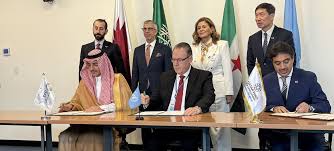Doha Agreement: A Triangular Initiative to Support Stability in Syria
September 25, 20251196 ViewsRead Time: 2 minutes

Font Size:
16
In a notable development in the regional humanitarian scene, the Qatari capital Doha witnessed the signing of a joint funding agreement between the Qatar Development Fund, the Saudi Development Fund, and the United Nations Development Programme. The agreement, valued at 89 million US dollars, aims to support the continued provision of essential services in Syria over the next three months.
This agreement represents a model of international and regional cooperation in addressing humanitarian crises, as it brings together representatives from Qatar, Saudi Arabia, and the United Nations for the first time within a single framework. This joint funding comes as a continuation of a previous announcement made last July regarding financial support for public sector workers in Syria.
Following this agreement, nine other agreements are set to be signed with specialized UN agencies, covering vital areas such as education, health, food, and climate. This expansion in the scope of support reflects an attempt to address the multiple challenges facing the Syrian people.
Regionally, this initiative highlights a shift in the Gulf approach towards the Syrian file, as Qatar and Saudi Arabia show an increasing interest in a proactive regional role in supporting Syria's stability. This trend aligns with international efforts seeking sustainable solutions to the Syrian crisis.
Challenges remain despite the importance of this initiative, as humanitarian needs in Syria far exceed what this agreement provides. Achieving a sustainable impact also requires a shift from temporary support to developmental projects capable of making a real difference in the lives of Syrians.
The Doha Agreement represents a step towards enhancing regional and international cooperation, but its success will be measured by its ability to translate aid into tangible impact on the ground, and by the stakeholders' capacity to build this temporary initiative into a long-term developmental partnership.
This agreement represents a model of international and regional cooperation in addressing humanitarian crises, as it brings together representatives from Qatar, Saudi Arabia, and the United Nations for the first time within a single framework. This joint funding comes as a continuation of a previous announcement made last July regarding financial support for public sector workers in Syria.
Following this agreement, nine other agreements are set to be signed with specialized UN agencies, covering vital areas such as education, health, food, and climate. This expansion in the scope of support reflects an attempt to address the multiple challenges facing the Syrian people.
Regionally, this initiative highlights a shift in the Gulf approach towards the Syrian file, as Qatar and Saudi Arabia show an increasing interest in a proactive regional role in supporting Syria's stability. This trend aligns with international efforts seeking sustainable solutions to the Syrian crisis.
Challenges remain despite the importance of this initiative, as humanitarian needs in Syria far exceed what this agreement provides. Achieving a sustainable impact also requires a shift from temporary support to developmental projects capable of making a real difference in the lives of Syrians.
The Doha Agreement represents a step towards enhancing regional and international cooperation, but its success will be measured by its ability to translate aid into tangible impact on the ground, and by the stakeholders' capacity to build this temporary initiative into a long-term developmental partnership.